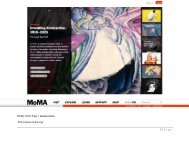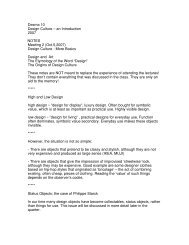ALLI BERK DMA 25 - Users
ALLI BERK DMA 25 - Users
ALLI BERK DMA 25 - Users
You also want an ePaper? Increase the reach of your titles
YUMPU automatically turns print PDFs into web optimized ePapers that Google loves.
2 SPOT COLORS<br />
WALTER<br />
BENJAMIN<br />
was one of the most original cultural<br />
critics of the twentieth century. Illuminations<br />
includes his views on<br />
Kafka, with whom he felt a close<br />
personal affinity; his studies on<br />
Baudelaire and Proust; and his essays<br />
on Leskov and on Brecht’s<br />
Epic Theater. Also included are<br />
his penetrating study “The Work<br />
of Art in the Age of Mechanical<br />
Reproduction,” an enlightening<br />
discussion of translation as a literary<br />
mode, and Benjamin’s theses<br />
on the philosophy of history. Hannah<br />
Arendt selected the essays<br />
for this volume and introduces<br />
them with a classic essay about<br />
Benjamin’s life in dark times. Also<br />
included is a new preface by Leon<br />
Wieseltier that explores Benjamin’s<br />
continued relevance for our times.<br />
ISBN-13: 978-0805202410<br />
Schocken Books, New York www.schocken.com 9/2007 Printed in “One of the great, unclassifiable writers of the century.” Robert<br />
the USA © 2007 Random House, Inc. Literary Essays, Philosophy Moore, Chicago, IL “Beautiful, dark prose” Goodreads, Brooklyn,<br />
“On Some Motifs in Baudelaire”<br />
Illuminations: Essays and Reflections<br />
WALTER BENJAMIN<br />
Illuminations: Essays and Reflections Preface by Leon Wieseltier Edited by Hannah Arendt<br />
“On Some Motifs in Baudelaire”<br />
Fear, revulsion, and horror were the<br />
emotions which the big-city crowd<br />
aroused in those who first observed<br />
it. For Poe it has something barbaric;<br />
discipline just barely manages<br />
to tame it. Later, James Ensor tirelessly<br />
confronted its discipline with<br />
its wildness; he liked to put military<br />
groups in his carnival mobs, and<br />
both got along splendid- ly—as<br />
the prototype of totalitarian states,<br />
in which the police make common<br />
cause with the looters. Valéry, who<br />
has a fine eye for the cluster of<br />
symptoms called “civilization,” has<br />
characterized one of the pertinent<br />
facts. “The inhabitant of the great<br />
urban centers,” he writes, “reverts<br />
to a state of savagery—that is, of<br />
isolation. The feeling of being dependent<br />
on others, which used to<br />
be kept alive by need, is gradually<br />
blunted in the smooth functioning<br />
of the social mechanism. Any improvement<br />
of this mechanism eliminates<br />
certain modes of behavior<br />
and emo- tions.” Comfort isolates;<br />
on the other hand, it brings those<br />
enjoying it closer to mechanization.<br />
Translated by Harry Zohn<br />
WALTER<br />
BENJAMIN<br />
/ 39



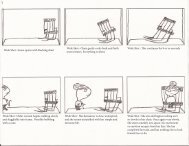
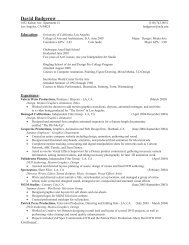

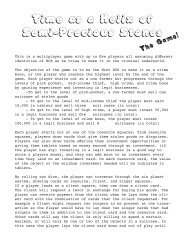


![final presentation posters [22 MB] - DMA Classes - UCLA](https://img.yumpu.com/42483561/1/182x260/final-presentation-posters-22-mb-dma-classes-ucla.jpg?quality=85)


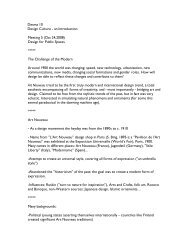
![download assignments [PDF] - DMA Classes - UCLA](https://img.yumpu.com/37499738/1/184x260/download-assignments-pdf-dma-classes-ucla.jpg?quality=85)
